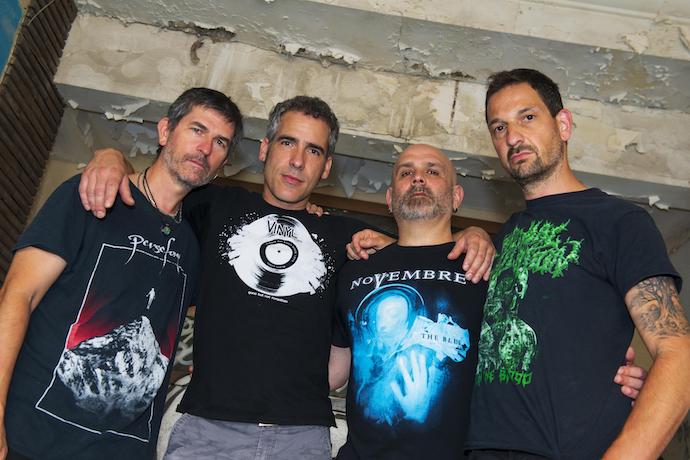
(We present Comrade Aleks‘ interview of Ion Santos, a member of the Basque Country melodic death metal band Hopelessness, whose roots go back more than two decades, and who are now alive and well after a long recording hiatus, with a new EP released last year.)
The Basque melodic death metal outfit Hopelessness never hurried. Founded 22 years ago, this band lived through two splits and released only one album, Broken Tears in Solitude, back in 2005. Their road was rocky, but it seems that they found the way out and returned to an active creative pace. I found Hopelessness‘ EP Mukuru, which saw the light of day in November 2022, a decent example of melodeath, and I invite you to taste it right now as you’re reading this interview with band guitarist Ion Santos.
******
Hi Hopelessness! Who’s online today? What’s new in the Hopelessness world?
Hi Aleks! How are you? I’m Ion from Gipuzkoa, a province in the Basque Country!!! We are currently working on new material and playing some gigs in the area.
Nice to meet you Ion! What’s the story behind the band’s origin? What did you aim to do back then in 2001?
First, Patxi (guitar), Txemi (drums), and Igor (vocals) formed the band in 2001. A few months later I joined the band on bass, and with this line-up and a repertoire of 8 of our own songs and some cover versions of Accept and In Flames we played two gigs. In 2003 we recorded our first demo (Paradise of Sin), and at the same time as it was being recorded Borja joined the band as bass player and I took over the guitar, as a stable line-up that lasted until 2007.
We all came from playing in other bands and we knew each other because we are from Legazpi, Zumarraga, and Urretxu, nearby towns, and we used to coincide in concerts, metal festivals, bars in the area, and we knew what we liked. METAL of course! So we wanted to have a good time and enjoy what we liked, which is making music, playing live, and drinking beer!
Did you choose back then which side to take, playing both Accept and In Flames? Why didn’t it end with good old heavy?
All of us have always listened to classic heavy music, but each of us has different preferences, and as we all contribute ideas when composing, the influences are many and varied.
We can listen to classic heavy music, like for example Maiden or Dio, more progressive music, (Opeth, Persefone, Between the Buried and Me), more doom music like Anathema, Novembre (we used to play “My Starving Bambina” from Novembre) up to more extreme music like Dying Fetus and Suffocation.
You recorded the first and only full-length album Broken Tears in Solitude in 2005. Were you happy with its sound?
Broken Tears in Solitude was recorded at Sound Souce Studios, which at that time and without leaving the province was our best option. The owner of the studio (Arkaitz) is a real crack both recording and playing bass (he played in Continuo Renacer, an instrumental band with jazz tinges of great quality), so he had very good taste in everything he did. And to answer your question, we are neither conformists when it comes to sound nor professionals, but we are very happy with the sound, to be honest.
What kind of feedback did you get after the album’s release? Were you supported by the local underground scene? How active was the band in those years?
We had good reviews of the album; we don’t make music to please people, we do it because we enjoy doing so, but it is appreciated when your work is acknowledged.
After the release of the album we played a lot of gigs both locally and outside our comfort zone. It was the most active time of the band with the initial line-up, and wherever we went we felt supported by the audience. Someone always came up to us to tell us that they liked the performance or to buy a record, so we have good memories of that time.
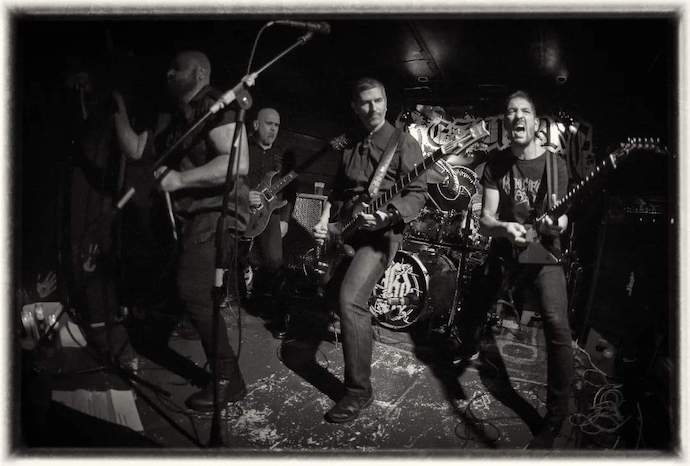
With what kind of bands did you share the stage with during those years? And did you play abroad?
We shared stages with many bands. We played several gigs with Continuo Renacer, Ataxia, Darkness by Oath, Odd Heathenish, to name a few. We were also lucky enough to play in some festivals. In Loiu (Bizkaia) October Underground Fest was held and we played with bands like Numen, Misanthrope, or Cerebral Effusion. In Molins de Rei (Barcelona) we played at the Move Your Fucking Brain festival and played with Squash Bowels and Estuary among others.
What led the band to break up in 2007?
The demo (Paradise of Sin) was self-released, so far so good. With Broken Tears in Solitude the problems started. We signed for a label that I prefer not to name, which disappeared and left us in the lurch with 1000 records that we decided to keep (a bad decision). A few months later a French label, Death Sun Records, offered us another record deal that we couldn’t sign because we had already released copies with another label whose name we don’t even want to remember. So Broken Tears in Solitude didn’t come out much beyond our borders. All this ended up undermining the band and we fell into discouragement which led to the dissolution of the band in 2007.
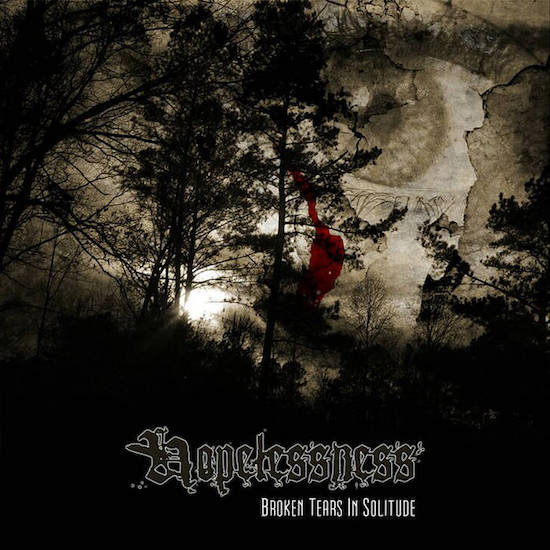
You tried to restore Hopelessness in the period between 2010 and 2012 but didn’t succeed. What happened during these years?
In 2010 we decided to try again. We were offered to play several gigs and we decided to come back. Raff (Nekrobabies, Oxida) joined as bass player, and with this lineup we played several gigs although we didn’t write any songs. We enjoyed playing live but we didn’t have a venue and we rehearsed in a borrowed place; when we couldn’t find a place we got discouraged and we left again two years later.
And made you return in 2017? The underground changed a lot, and the way promotion works and the way records sell has changed a lot, so how did you adapt to the new rules?
In 2017 we returned. They offered us several concerts in our area and they lent us a place again, but this was still a problem. After a year or so, Raff (bass) and Igor (vocals) decided to leave the band, but we managed to find a permanent rehearsal space. And Aitor, who is now a stable member of the band, joined as bass player.
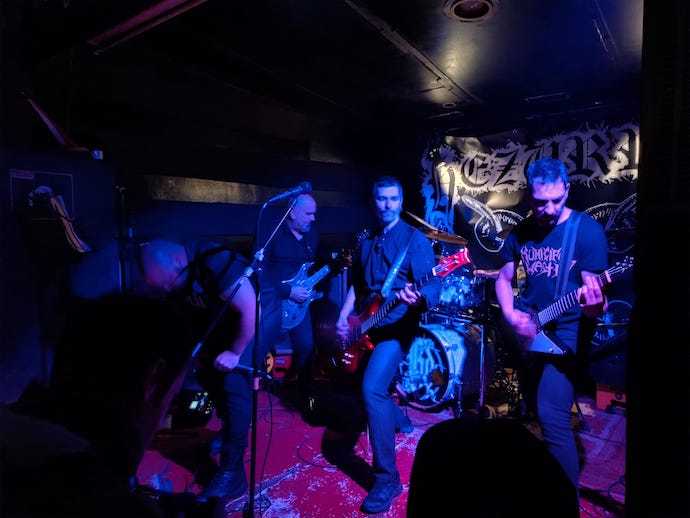
Why didn’t you join other bands each time when Hopelessness broke up?
I personally didn’t find motivation in other bands that I had the opportunity to play in. Patxi was playing in Taupada together with Aitor. Igor created several musical projects (Abandonment, Human Embroidery, Vaginal Flatulation…), Txemi formed a cover band of classic bands such as Led Zeppelin, Deep Purple, DIO, etc…. Currently Igor and I have a project (Putrid Torso) and we have just released a Demo Prologue To Nowhere.
Basque Metal Country released Hopelessness’ new EP Mukuru in November 2022. How long did you work over it?
From 2018 to 2022 the five songs of Mukuru were composed. It was a hard-working period. We are not very conformist with what we do and we like to enjoy every song we do, so it was a somewhat long period for only five songs. But we could take a minute and a half out of a song and then put it back together again and move on until we were happy with the result. The most important thing is that we are friends and we enjoy being together, so we had no pressure. We had a great time composing with beers and pizzas!
What’s the concept, both musically and lyrically, behind these songs?
The first thing to compose was the music; we didn’t think much about how the vocals were going to be, since Igor left the band at the beginning, and we didn’t know how everything was going to evolve. We didn’t think about how to please anyone or any specific structure when composing the songs. We make the songs in a quite free way in that sense. But there comes a moment when you think about recording what you have and we asked Igor (vocals) if he would like to collaborate on the album and he said yes. At that moment, we started to compose the lyrics and the vocal lines.
Each song talks about a different subject. For example “Errituala” talks about schizophrenia, “Lur Atsekabetua” about the lack of respect for Mother Nature nowadays, “Bidegurutzean” about destiny….. Once the lyrics were written, Igor recorded the vocals and at the same time Ramón Sánchez did the artwork. Ramón created an illustration for each song on the album, inspired both by the lyrics and the music of each song.
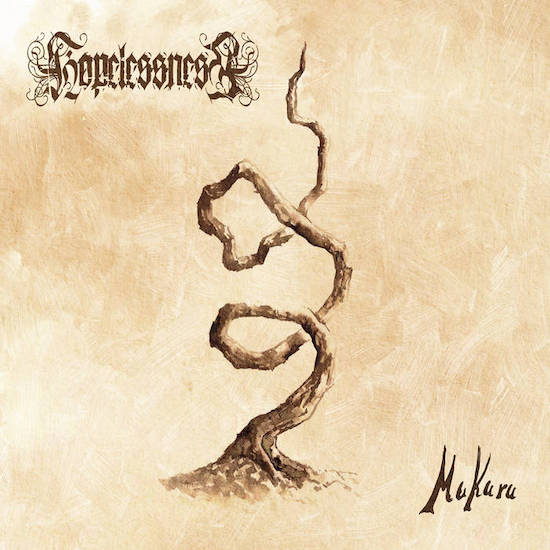
You sing in Spanish nowadays, as Broken Tears in Solitude is an “English” album. Why did you switch on your mother tongue?
Our mother tongues are both Basque and Spanish but the music we listen to is mostly in English, even though we don’t speak English (for this interview for example, we asked for help with the translations). So, we decided to record in English. Many metal bands in The Basque Country sing in Basque, a few in Spanish. But for Mukuru we decided to change and we switched to Basque and Latin. So our songs at the moment are in these three languages, although we only use Basque and Spanish in our daily life.
How would you describe the local scene? How often do you play gigs nowadays? Do you have local metal festivals?
Locally, new metal bands are still coming out. On the “Herriko Burdina” website you can see all the bands in the Basque Country, and I would say that the scene is in good shape. Concerts are still being organised, although not like 15 years ago when you could have concerts almost every weekend.
We play gigs less often now. Everyone has their family, their job, and their commitments and it’s often difficult to get together even to rehearse, but if we get an interesting gig at a venue or festival we can’t resist!
There are small local festivals like Hezurre Fest in the Gaztetxe in Urretxu, where we have played twice, HellBona in Villabona, and some bigger festivals with international bands like Dimetal Fest in Dima.
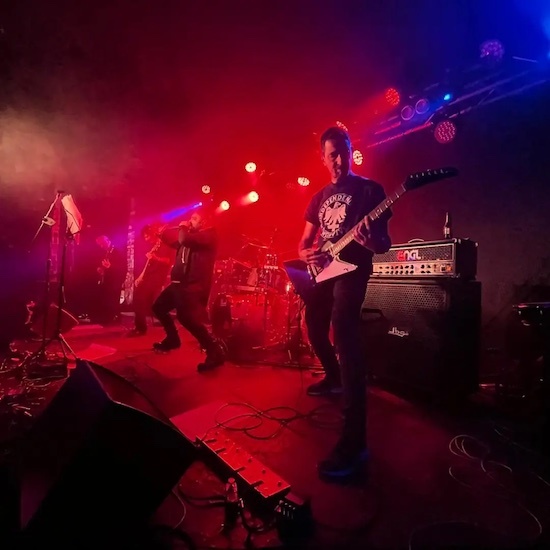
How do you see Hopelessness’ prospects now and do you already have new material for the next release?
We have given two concerts with the collaboration of Igor on vocals; the last one was in the “Doka Hall” in Donostia with Ancient Settlers. We don’t have anything new at the moment. We are still writing new songs. The idea is to do some more songs and try to get an album published or if possible a re-release of Mukuru, but we haven’t had much success with the record companies although we don’t lose hope.
Thanks for the interview Ion! And let’s hope that this interview will help Hopelessness to reach more listeners!
Thanks for the interview Aleks!! It was a pleasure to answer your questions! Goodbye!
https://hopelessnessmetal.bandcamp.com/
https://www.facebook.com/hopelessnessmetal/
